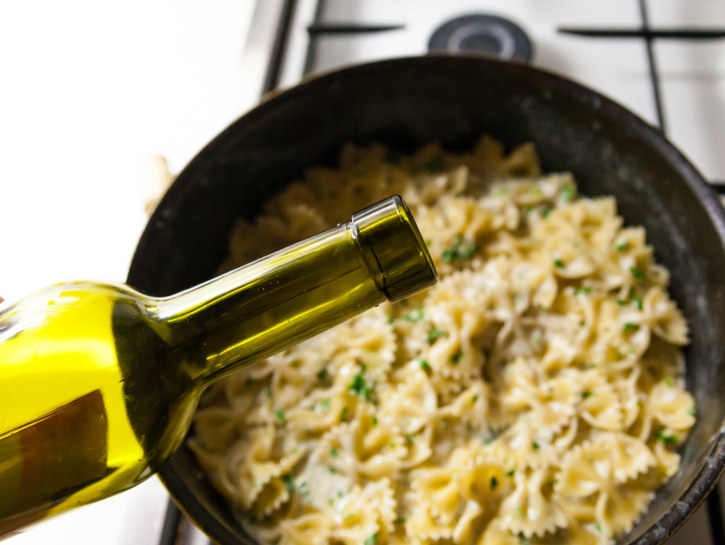Though wine is a popular drink of choice for many people, both red and white wines are popular ingredients used in cooking as well. Wine is typically used during the cooking process to provide moisture, tenderize meat and supply rich flavor.
But if you’re not a wino or choose to avoid alcohol altogether, there are plenty of options for non-alcoholic substitutes that will give your dish the same great taste and tenderness.
For red wines, try using:
- Cranberry juice
- Pomegranate juice
- Red wine vinegar
- Chicken, beef or vegetable stock
For white wines, substitute:
- Ginger ale
- Lemon juice
- White grape juice
- White wine vinegar

Africa Studio/Shutterstock
Red Wine
Substitute Cranberry Juice
Recommended ratio: equal replacement
Like red wine, cranberry juice is rich in flavor and tart, making it a great non-alcoholic substitute that will deepen the recipe’s flavor. Cranberry juice is naturally sweeter than most red wines, so if the recipe calls for additional sweeteners make sure to skip them — otherwise, your dish could come out too sweet and sugary. You can also reduce the sweetness by adding a tablespoon of vinegar to the juice.

bitt24/Shutterstock
Substitute Pomegranate Juice
Recommended ratio: equal replacement
Pomegranate juice is similar to red wine in its color and flavor. Because it’s so fruity, using pomegranate juice will enhance the dish’s flavor in a way akin to red wine. Pomegranate juice is a bit less acidic than red wine, so if you want to bump it up a notch just mix vinegar into the juice — about one tablespoon of vinegar per every cup of juice. This substitute works best when used to make salad dressings or glazes for vegetables.

Mantana Boonsatr/Shutterstock
Substitute Red Wine Vinegar
Recommended ratio: 1/2 the amount the recipe calls for, plus an equal amount of water
Red wine vinegar is essentially a tangy, acidic wine that is commonly used in cooking. Because the vinegar shares flavor and properties similar to regular red wine, it’s an easy substitute that won’t affect the flavor of the dish on a grand scale. This substitute goes particularly well when used with beef, vegetables or pork. However, because wine vinegar is much more acidic than regular wine, dilute the mixture by mixing an even amount of water with the wine vinegar to subdue the tanginess.

DPRM/Shutterstock
Substitute Stock
Recommended ratio: equal replacement
Chicken, beef or vegetable stock might not be an obvious substitute for red wine, but it works as a good substitute for wine due to its similar function in cooking — adding flavor and tenderizing meat. That said, the stock is much less acidic and more mild in flavor than wine, so to make it a more accurate substitute try adding a tablespoon of vinegar to the liquid.

Madeleine Steinbach/Shutterstock
White Wine
Substitute Ginger Ale
Recommended ratio: equal replacement
Ginger ale is similar in color and flavor to white wine, and its high acidity works well as a meat tenderizer. This substitute is best suited as a meat marinade because it breaks down the meat and makes it softer and more tender. You can evenly exchange white wine with ginger ale because they are both acidic and sweet.

Brent Hofacker/Shutterstock
Substitute Lemon Juice
Recommended ratio: 1/2 the amount the recipe calls for, plus an equal amount of water
Adding lemon juice to dishes in place of white wine adds acidity and flavor to the food, making it a great substitute. But because lemon juice is so much sourer than white wine, mix it with an equal amount of water before adding to the recipe to mellow out the strong sour flavor.

Joshua Resnick/Shutterstock
Substitute White Grape Juice
Recommended ratio: equal replacement
White grape juice is similar in flavor and color to white wine, which makes it a near-perfect substitution for white wine. Because wine and grape juice both come from grapes, the drinks are fundamentally similar and you can substitute easily at a 1:1 ratio. If you find the substitution too sweet, just add a tablespoon of vinegar to make it more acidic.

Africa Studio/Shutterstock
Substitute White Wine Vinegar
Recommended ratio: equal replacement
Like red wine vinegar, white wine vinegar has many similar properties to white wine, minus the alcohol. It’s a great substitute to use when preparing fish and chicken. Again, because the vinegar is much tangier and acidic, mix the white wine vinegar with water at a 1:1 ratio before adding it to the recipe.

DPRM/Shutterstock
